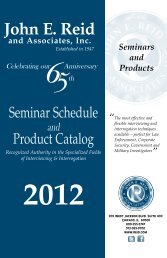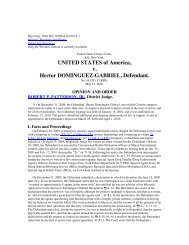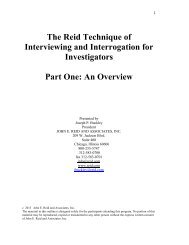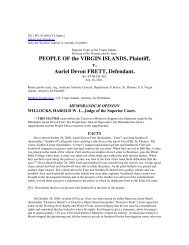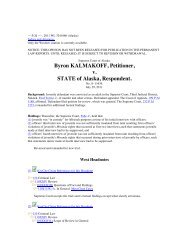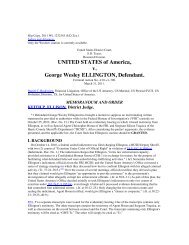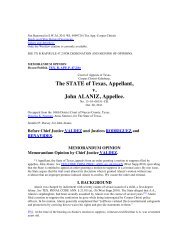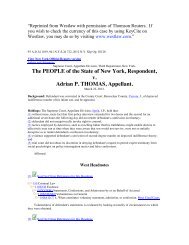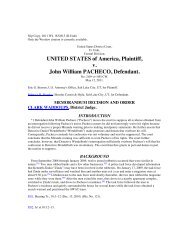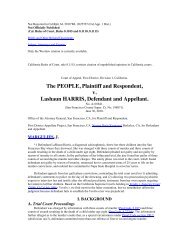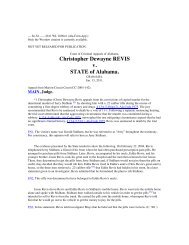James DAY Jr. Appellant v STATE of Florida Appellee
Day case - The Reid Technique of interviewing and interrogation
Day case - The Reid Technique of interviewing and interrogation
- No tags were found...
You also want an ePaper? Increase the reach of your titles
YUMPU automatically turns print PDFs into web optimized ePapers that Google loves.
“A trial court's ruling on a motion to suppress comes to the appellate court clothed with a presumption <strong>of</strong><br />
correctness and the court must interpret the evidence and reasonable inferences and deductions derived<br />
therefrom in a manner most favorable to sustaining the trial court's ruling.” An appellate court accords a<br />
presumption <strong>of</strong> correctness to the trial court's ruling on motion to suppress with regard to the trial court's<br />
determination <strong>of</strong> historical facts, but independently reviews mixed questions <strong>of</strong> law and fact.<br />
Tengbergen v. State, 9 So.3d 729, 733 (Fla. 4th DCA 2009) (citations omitted). We review appellant's<br />
statement to determine if it was given as a result <strong>of</strong> improper inducement.<br />
[1] In the statement introduced at trial, appellant confessed to illegal acts after the investigator's<br />
many invocations <strong>of</strong> <strong>of</strong>fers to help him. Initially, the investigator stated, “Um, if-if something happened and<br />
its accidental-then we can work something out. But if it's something that-cause I don't see you as a predator,<br />
okay. I don't see you as a guy to go out there and start doing some crazy things.” A little while later, the<br />
investigator stated,<br />
Okay. And-if I just want to know what happened. If there's something that we can fix and we can work<br />
with, then that's what I want to know, okay. I don't want to sit here and start saying, well you-I'm not<br />
accusing you <strong>of</strong> anything. *1180 I'm trying to ask you what happened that night because I know, I know<br />
that something happened....<br />
Then the investigator stated, “That's why I'm telling you, I wasn't there and this-I'm trying to give you the<br />
opportunity for you to help yourself so that I can work something out for you.”<br />
A few pages later in the statement, the investigator stated, “That's what I want to know. At least give me<br />
something. Tell me that this is what I did, you know.” A brief time later, the investigator stated,<br />
Well this is why you're here, to help yourself. Because you know what, if you were-if you were to get<br />
arrested on a charge <strong>of</strong> sexual battery, right, and you go before a judge or a jury and they actually get my<br />
version <strong>of</strong>-that you cooperated in the investigation, it does look a hell <strong>of</strong> a lot better for you than for you to<br />
sit there and fabricate story after story after story....<br />
Then the investigator told appellant,<br />
But you know what, it doesn't matter, it helps you-it helps you when I talk to the State Attorney and I tell<br />
them what type <strong>of</strong> person you were and how honest you were as to what happened, okay. It doesn't look<br />
good for you when you sit there and start trying to not say what happened....<br />
Briefly later appellant stated that “I just don't want to go to jail. I don't like it there.” The investigator<br />
responded that “you may be able to bond out like right in a couple <strong>of</strong> hours. You just got to get booked.<br />
What happened, <strong>James</strong>?” Whereupon, appellant asked, “You gonna help me?” The investigator answered,<br />
“I can do my best and talk to the State Attorney. That's what I can tell you.” A page later in the transcript<br />
the investigator stated the following, “I'm gonna tell the State Attorney exactly what you're telling me. You<br />
are cooperating with me. You are telling me what happened. As long as you are honest with me, and I have<br />
a lot more than just putting lotion on her, okay. And this is why I-I need you to-to help yourself.”<br />
Finally, the investigator told appellant to “[t]rust me. Trust me,” and<br />
what I'm trying to do is I'm trying to figure out everything that happened here. I'm gonna-I'm gonna present<br />
this case to the State, okay. They're gonna go based on what I tell them, alright. You've put lotion on her in<br />
the bathroom, correct? Is that why you went to the bathroom?<br />
Only after all these statements by the investigator did appellant admit to placing lotion on the victim's<br />
breasts and make other inculpatory statements. FN1




